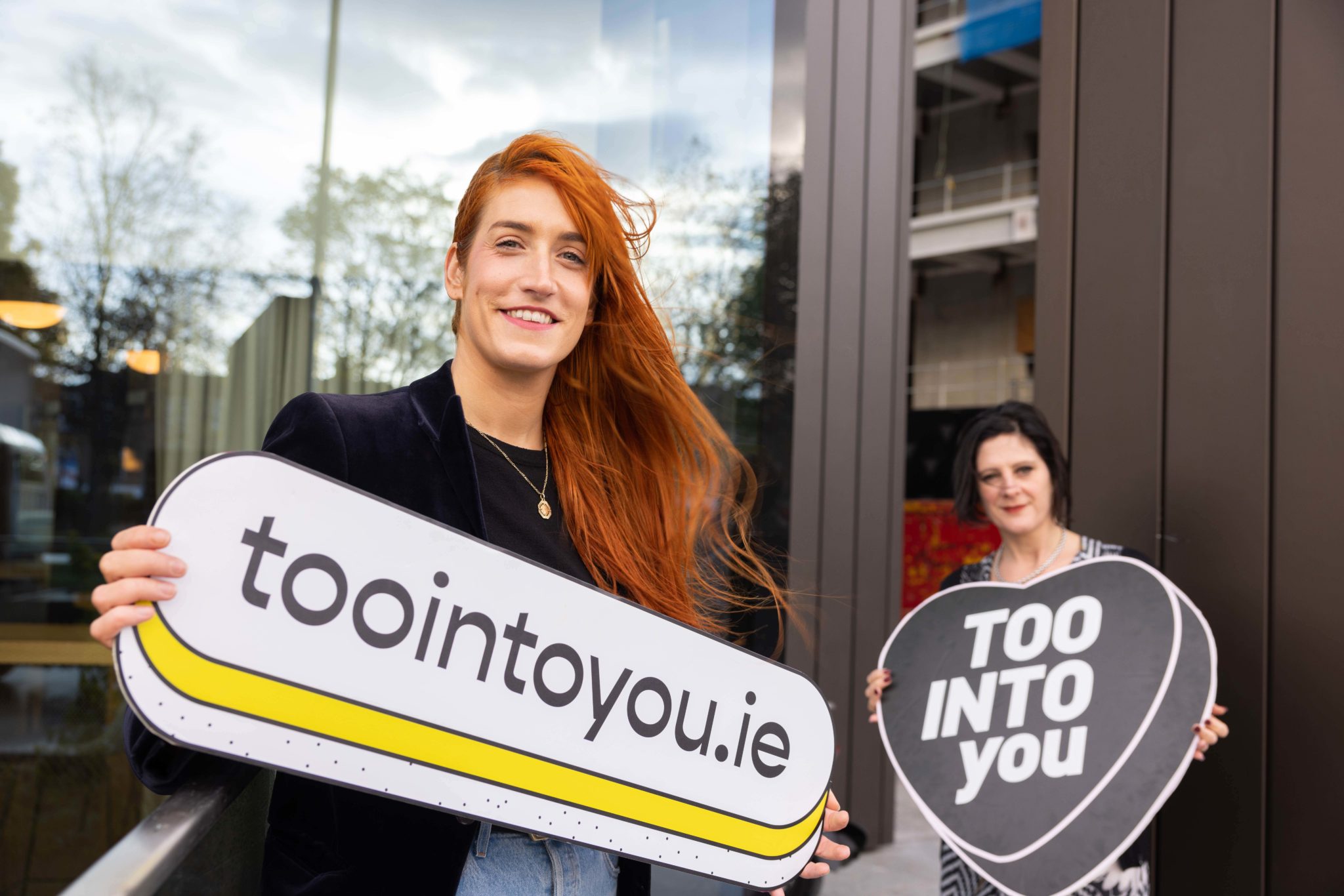- Culture
- 14 Sep 23

The ‘Too Into You’ Campaign and the Men’s Development Network aim to educate college students about toxic relationships, and what Ireland needs to change, going forward.
Starting college offers a lot of freedom, but also challenges. You meet new people and develop new relationships. And you might just get into your first adult relationship. This can be wonderful, but it’s also important to know what a healthy relationship is.
Too Into You is a campaign run by Women’s Aid, the National Domestic Violence Service, focusing on young people in relationships. The campaign came about after the service noticed an increase in calls from people aged 18 to 25. Too Into You provides information, and offers confidential support and expert advice, but it is not intrusive. The service is there for you – you’re the one in control.
“In Ireland, one in five young women and one in eleven young men have been abused by their partner or ex,” Mary Hayes of Women’s Aid reveals. “With ‘Too Into You’, we wanted young people to realise that, unfortunately, abuse is common. It can happen when you’re young, it can even happen in your first relationship – but there are specific supports available.”
Dr Caroline West is a sex educator and host of the Glow West podcast. She characterises the period of a young person’s life when they’re being released into the adult world as a ‘perfect storm’. “I think when people start college, they’re often being an adult out in the world – being independent – for the first time. Maybe these people are living out of home, maybe they’re consuming a lot of alcohol and there’s a lot of pressure to socialise, or to be sexually active. It’s a lot!

Advertisement
“I always liken it to driving,” she adds. “If you plonk someone in a car and say, ‘Off you go’, it’s probably going to be a horrible experience. Sex is the same thing. We need to know what boundaries are and what red flags are, and how to protect yourself.”
Education: an epic fail
It might help if people were better prepared...
“As the second-level curriculum stands, those heading into college aren’t learning about relationships in school,” Mary Hayes comments. “We know the SPHE curriculum is being reviewed and it will include information on controlling relationships, which is fantastic. But right now, they’re not learning about this in schools, they’re learning about it from their friends, from their families, from pop culture, the media, etc.”
Dr West adds: “A lot of colleges are implementing consent education as part of orientation, but also throughout the year. But it would be great if we were able to provide some more spaces for workshops or events where people can go and find out information that works for them.”
Are there signs to watch for?
The experts say that there’s an extensive number of warning signs that your relationship is becoming toxic, or that your partner is becoming abusive. Mary Hayes breaks down some of these.
“One of the common red flags would be your partner saying they hate your friends,” she says, “complaining that you spend too much time with them, or saying that your friends are a bad influence on you.
“Other signs include sending you constant message; getting mad if you don’t reply; demanding to look through your phone; criticising you or putting you down; telling you what you can or can’t wear; where you can or can’t go; or who you can or can’t speak to. They might also force – or guilt – you into doing things sexually that you don’t want to do or that you’re not ready for. Oftentimes, they’ll threaten to hurt themselves or to hurt you if you break up with them.
“If you’re walking on eggshells around them,” she adds, “or they have a bad temper, or they accuse you of cheating on them all the time – these are serious signs of an unhealthy relationship.”
What kind of abuse is most common?
Advertisement
There is a common misconception that it doesn’t qualify as abuse if it isn’t physical. This is completely untrue.
“Emotional abuse is by far the most common form of abuse against young people,” notes Hayes. “Also, there’s an assumption that in relationships, consent is kind of a given, and you don’t have to check in with your partner. Consent is just as important within intimate relationships, as it is in a more casual hook-up. Sexual coercion is a serious form of abuse.
“We know that online abuse is incredibly common, especially amongst young people,” she adds. “The online space has made it easier to facilitate dangerous and controlling behaviours. For example, your partner could be tracking your location or wanting to know what you’re doing and who you’re with all the time. Even if you’re not with your partner, they’re still able to exert control over you.”
 Mary Hayes, who leads the Too Into You project at Women’s Aid
Mary Hayes, who leads the Too Into You project at Women’s AidIt’s not just women that face abuse...
A lot of people assume that partner abuse involves a man violently penetrating or attacking a woman. With other forms of abuse, people are often concerned it’s not severe enough to report.
“It’s important to understand sexual violence is a spectrum,” Dr West emphasises. “We must empower people to understand all forms, so that if it happens to them, they can identify the situation and reach out for support. It’s important to get the message out there that it can be experienced by anyone – and that the support services are open to everybody.”
Men’s Development Network are an organisation working with men on different levels: one-to-one, developmental, parenting, behaviour change group work, training, phone line support, and awareness-raising. They do this work through funded projects including Men’s Development Programme, Men’s Health Programme, Mend Domestic Violence Intervention Programme, Men’s Advice Line and Men’s Counselling Service.
Advertisement
“It’s extremely important for us to acknowledge both nationally and internationally, women are the primary survivors/victims of Domestic, Sexual and Gender-Based Violence,” says Colm Kelly Ryan, Head of Programmes and Advocacy at MDN. “However, DSGBV can be experienced by anyone of any gender identity, including men. Through our Male Advice Line, we listen to and support male victims of domestic abuse every day.
“My key message is that our service for male victims and Women’s Aid’s service for female victims are confidential spaces where a person will be listened to, supported and believed. Abuse is abuse, violence is violence, and we need to create a zero-tolerance approach to all forms of DSGBV.
“With support from the Department of Justice, over the past year, we’ve been working with White Ribbon pilot programme in secondary schools to upskill staff in how to engage boys as allies for gender equality and ending Gender-Based Violence. This gives me hope, because I see how committed schools are to addressing DSGBV, and how changing the culture and norms underpinning violence is beginning to take place in schools across the country. The earlier that these initiatives take place, the better.”
MDN have also been working within certain third-level institutions as part of the Equality, Diversity and Inclusion programmes.
Movement of young people
“The Too Into You campaign aims to create a movement of young people who know abuse is not acceptable, that it’s common amongst their age group, and that we all deserve to have happy and healthy relationships,” says Mary Hayes. “Abuse can feel so incredibly isolating. But if you were to even share a ‘Too Into You’ post on your Instagram story, and say a friend in that situation came across it – that tells them you will believe them. It says you don’t stand for intimate relationship abuse, that there are supports available for them, and that they don’t have to go through this alone.”
Read the full Student Special in the current issue of Hot Press – out now:










